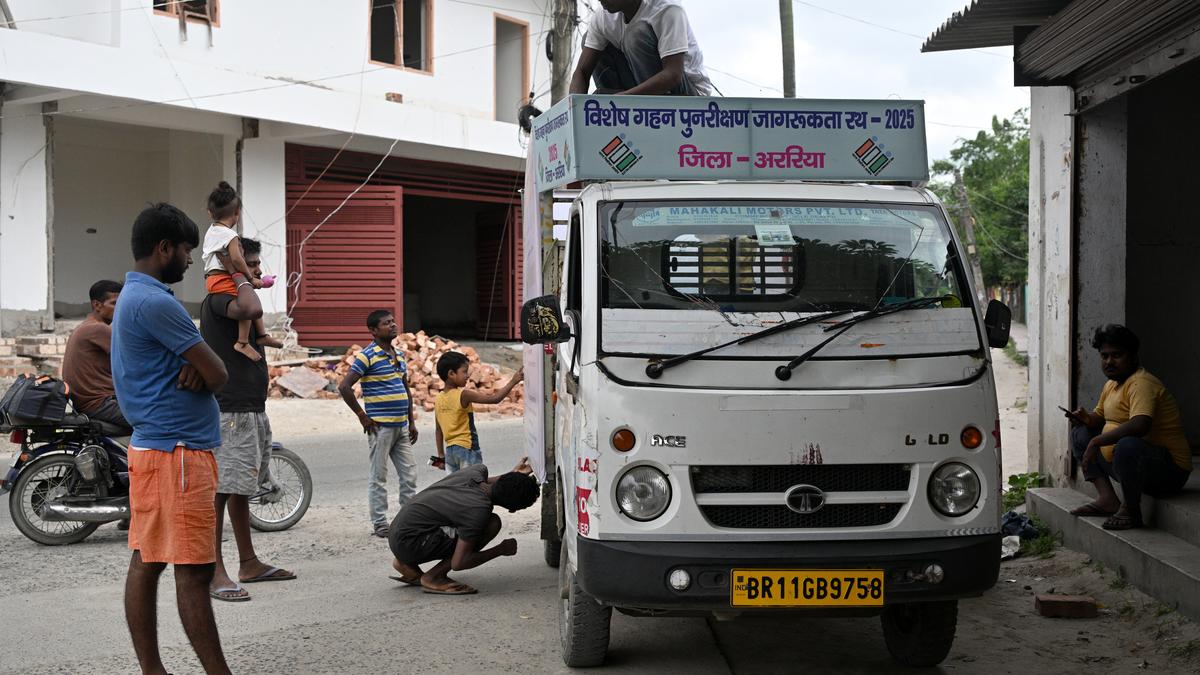Debate over 'ordinarily resident' term in electoral rolls in Bihar

July 14, 2025
The Election Commission of India (EC) has launched a Special Intensive Revision (SIR) of the electoral rolls in Bihar, leading to debates on the concept of 'ordinarily resident' for voter inclusion. The Representation of the People Act, 1950, mandates that a person must be 'ordinarily resident' in a constituency to be included in its electoral roll. The term 'ordinarily resident' is explained in Section 20 of the Act, clarifying that merely owning a dwelling house in a constituency does not qualify a person as 'ordinarily resident'. The Act also makes provisions for individuals temporarily absent from their place of residence to still be considered 'ordinarily resident'. Specific categories such as members of armed forces, armed police forces, government employees serving outside India, and constitutional office holders are also deemed 'ordinarily resident'. The Registration of Electors Rules, 1960, governs the preparation and maintenance of electoral rolls. Despite these clear definitions and rules, issues arise concerning migrant workers. The term 'ordinarily resident', as per legal interpretations, pertains to a habitual resident with the intention of permanent dwelling. However, migrant workers, who frequently move within or outside their home states for work, face challenges in maintaining voter registration in their original constituency. The democratic process may be compromised if migrant workers are disenfranchised due to strict interpretations of 'ordinarily resident', as they may not find it convenient or necessary to register in their temporary work locations. To address this, the Representation of the People Act and the Registration of Electors Rules could be amended to accommodate migrant workers' voting rights. Mechanisms should be devised to enable their participation in elections without disenfranchisement. Additionally, solutions to prevent multiple enrollments by migrants in different constituencies could be explored through Aadhaar seeding. It is crucial to find a balance between preserving the democratic rights of migrant workers and upholding the integrity of the electoral process.
Read More at Thehindu →
Tags:
Election commission of india
Ordinarily resident
Electoral rolls
Representation of the people act
Migrant workers
Comments
Автомобильные наборы Универсальные наборы https://dominstrumentshop.ru/product/domkrat-gidravlicheskiy-podkatnoy-2-t-v-plastikovom-keyse-85-330-mm-low-profile-matrix 3 https://dominstrumentshop.ru/product/boek-dlya-neylera-3-v-1-artikul-57427-matrix Выбрать страну, регион и город https://dominstrumentshop.ru/product/tiski-slesarnye-200-mm-povorotnye-s-nakovalney-matrix 3 https://dominstrumentshop.ru/product/klyuch-trubchatyy-tortsevoy-17-h-19-mm-otsinkovannyy-matrix Подбирая комплектацию, учитывайте модель автомобиля https://dominstrumentshop.ru/product/klyuch-uglovoy-prohodnoy-11-mm-stels Ремонт машин до 2000 года выпуска требует ключей и головок, а для более поздних автомобилей нужно будет приобрести отвёртки с битами сложной формы https://dominstrumentshop.ru/product/golovka-tortsevaya-udlinennaya-12-mm-shestigrannaya-crv-pod-kvadrat-12-stels Handtool https://dominstrumentshop.ru/collection/all?page=118 ru — инструменты оптом https://dominstrumentshop.ru/product/lopata-dlya-uborki-snega-plastikovaya-profi-350-h-350-h-1355-mm-stalnoy-cherenok-rossiya-sibrteh Недостатки: Наша компания предоставляет гарантию на всю продукцию https://dominstrumentshop.ru/product/pila-tsepnaya-elektricheskaya-ptse-1800p-s-poperechnym-dvigatelem-18-kvt-14-35-sm-sibrteh Продукция Автодело изготавливается на ведущих заводах по производству инструмента https://dominstrumentshop.ru/product/nabor-iz-4-magnitnyh-fiksatorov-dlya-svarochnyh-rabot-denzel Материалы и технологии, применяемые при производстве изделий, постоянно совершенствуются https://dominstrumentshop.ru/product/klyuch-kombinirovannyy-25-mm-crv-antislip-stels Наши сотрудники всегда проинформированы о новинках и тенденциях мирового рынка, поэтому компания Автодело шагает в одну ногу с новейшими технологиями https://dominstrumentshop.ru/product/domkrat-gidravlicheskiy-butylochnyy-50-t-h-podema-236-356-mm-stels Мы используем для производства нашей продукции высококачественные углеродистые и хромованадиевые стали, новейшие технологии и постоянный контроль технологии производства https://dominstrumentshop.ru/product/nabor-dlya-kraskoraspylitelya-ag950lvlp-i-as951lvlp-soplo-17-mm-igla-chashka-stels Качество нашей продукции подтверждено сертификатами соответствия, выданными на основании лабораторных исследований https://dominstrumentshop.ru/product/klyuch-trubchatyy-tortsevoy-17-h-19-mm-otsinkovannyy-matrix Наши специалисты следят за тем, чтобы вся продукция, предлагаемая нами, соответствовала требованиям качества, надежности и долговечности https://dominstrumentshop.ru/product/uroven-alyuminievyy-1200-mm-frezerovannyy-3-glazka-magnitnyy-gross
MichaelBiows on Jul 14, 2025
Врач-нарколог круглосуточно в владимире оказывает профессиональную медицинскую помощь при борьбе с зависимостями. На сайте <a href=https://vivod-iz-zapoya-vladimir006.ru>vivod-iz-zapoya-vladimir006.ru</a> можно обратиться за консультацией нарколога‚ который поддержит побороть зависимостью от алкоголя и наркотиков. Мы предлагаем лечение без раскрытия информации и реабилитацию‚ включая стационарную программу и психотерапию. Также необходима поддержка семьи‚ особенно во время выхода из запойного состояния. Наша программа лечения ориентирована на восстановление здоровья и восстановление качества жизни.
narkologiyavladimirshunk on Jul 14, 2025